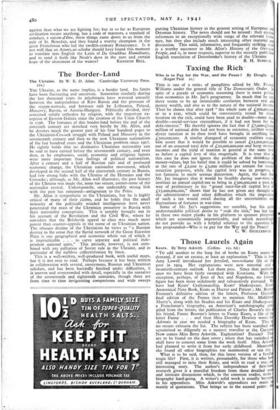Taxing the Rich .
Who is to Pay for the War, and the Peace? By Douglas ay, (Kegan Paul. IS.) THIS is one of a serie of pamphlets edited by Mr. Francis Williams under the general title of The Democratic Order. In spite of a parade of economic reasoning there is more politics than economics in Mr. Jay's programme. In much that he says there seems to be an inextricable confusion between real and money wealth, and also as to the nature of the national income, Thus he claims that after 1918 " the whole sum of £300,000,coo or so a year, which could be conveniently raised by direct taxation on the rich, could have been used to double—more that double—social-services expenditure, if it had not been for the debt-interest." He thereby ignores the fact that if £7,000-£8,000 million of national debt had not been in existence, neither would direct taxation at its then level have brought in anything like £300,000,000. A similar disregard of economic realities makes him assert that it would be possible to cancel £15,000,0oo,oco out of an assumed total debt of £20,000,000,000 and keep money- incomes and the yield of taxation in general at the same lend as before a capital levy of 'this magnitude. It is true that in this .case he does not ignore she problem of the shrinkage of money-values, but his belief that it could be solved by borrowing at the rate of £2,000 to £3,000 million per annum for recon- struction purposes, while the capital levy was in progress, is too fantastic to merit serious discussion. Again, the fact that Mr. Jay imagines that it would be feasible during war-time to institute an annual capital-tax to bring in £500,000,000 a year, bs way of preliminary to his "grand once-for-all capital levy of £15,600,000,000," shows that he has not given 'any thought t the administrative and other difficulties which the impositio of such a tax would entail during all the uncertainties an fluctuations of fortunes in war-time.
Some of Mr. Jay's suggestions are sensible, but his quit understandable political desire to " soak the rich," has led h' in these two major planks -in his platform to sponsor propos which are economically impracticable, and which according) do not provide us with a helpful solution to the question h has propounded—Who is to pay for the War and the Peace?
C. W. GUILLEBAUD.






























 Previous page
Previous page